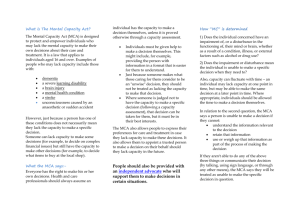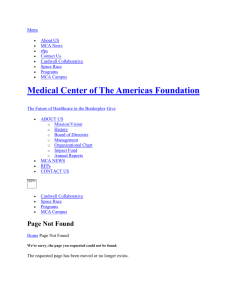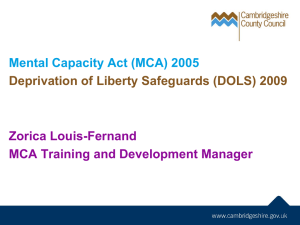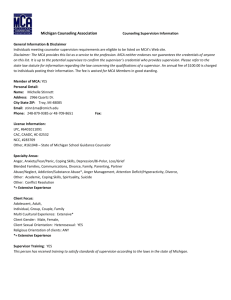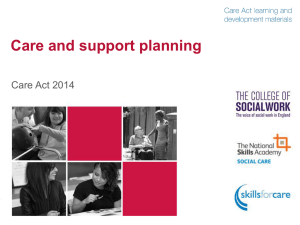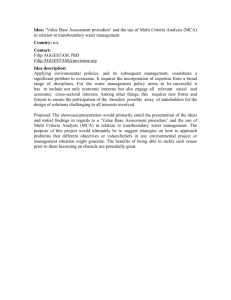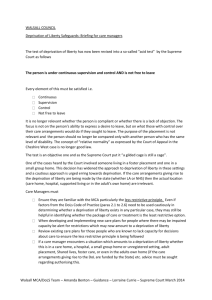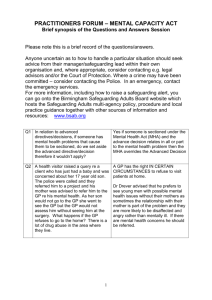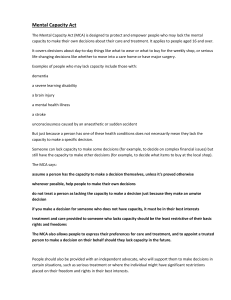The Mental Capacity Act and Deprivation of Liberty Safeguards
advertisement
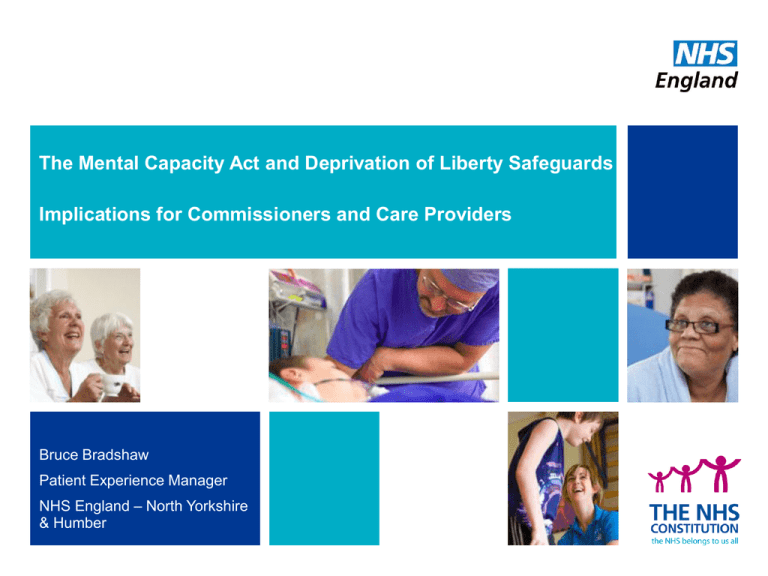
The Mental Capacity Act and Deprivation of Liberty Safeguards Implications for Commissioners and Care Providers Bruce Bradshaw Patient Experience Manager NHS England – North Yorkshire & Humber The outcomes people say they want related quality of life Accommodation cleanliness and comfort Food and nutrition Dignity Control over daily life Occupation Safety Social participation and involvement Personal cleanliness and comfort Feedback from People who use services People want to feel safe but also to maintain relationships Access to justice: criminal, social or restorative Support with Difficult Decision Making But, some 70% of all ‘social care clients’ lack capacity in some aspects of their decision making and need to be supported in the context of the Mental Capacity Act. This applies to some 80% of those in care homes. We think we will get this... ...we get this! The NHS Mandate 6 6Cs - Values essential to compassionate care Care Care is our core business and that of our organisations; and the care we deliver helps the individual person and improves the health of the whole community. Caring defines us and our work. People receiving care expect it to be right for them consistently throughout every stage of their life. Communication Communication is central to successful caring relationships and to effective team working. Listening is as important as what we say. It is essential for ‘No decision without me’. Communication is the key to a good workplace with benefits for those in our care and staff alike. 7 Compassion Competence Compassion is how care is given through relationships based on empathy, respect and dignity. Competence means all those in caring roles mist have the ability to understand an individual’s health and social needs. It can also be described as intelligent kindness and is central to how people perceive their care. It is also about having the expertise, clinical and technical knowledge to deliver effective care and treatments based on research and evidence. Courage Courage enables us to do the right thing for the people we care for, to speak up when we have concerns. It means we have the personal strength and vision to innovate and to embrace new ways of working. Commitment A commitment to our patients and populations is a cornerstone of what we do. We need to build on our commitment to improve the care and experience of our patients. We need to take action to make this vision and strategy a reality for all and meet the health and social care challenges ahead. Legal Framework • “Community care law remains a hotchpotch of conflicting statutes….” Luke Clements Community care and the Law • Statute Legal Terms: • Case Law • Codes of Practice • Professional Codes • Contracts • Policy • Procedures • Protocols 8 • • • • • Must Should/Shouldn’t May Duty ……. Legal Framework Human Rights Act e.g. Fraud Act; Sexual Offences Act Legal intervention with alleged perpetrator e.g. Mental Capacity Act/Deprivation of Liberty Safeguards; Mental Health Act Authority to act against person’s wishes Rights & duties on public bodies Equality Act; Health & Social Care Act 2008 & 2012; NHS Community Care Act 1990 Mental Capacity – A fundamental rights • Must assume a person has capacity unless proved otherwise Mental Capacity Act Principles • Must not do things or, take decisions for people without • Must not treat people as capacity in their best interests incapable of making a decision unless you have tried all you can to help them • Before doing something to someone or making a decision on their behalf, consider whether • Do not treat someone as you could achieve the outcome incapable of making a decision in a less restrictive way because their decision may seem unwise Mental capacity & duty of care • Adults have the right to make decisions – including decisions about the risks they are willing to take. • Adults may plan for future decisions • The right to make an unwise decision does not abdicate a duty of care – helping individuals in making informed choices & taking reasonable steps to offer support • Where adults lack capacity to make that decision, we have a duty to act in their best interests. Deprivation of liberty safeguard Low restriction High restriction Authorised under section 5 & 6 of the Mental Capacity Act Requires Deprivation of Liberty Authorisation Restriction(s) resulting in complete and effective control All care must be in the persons best interest and least restrictive as is viable. Unlawful restriction is a safeguarding issue Mental Capacity Act – Commissioners • Retains responsibility for assuring through the commissioning process compliance with the MCA 2005 and DoLS legislation of all providers of health care • Work with health providers and local authorities to ensure appropriate capacity in the system of professionals qualified to carry out best interest assessments • Support the training and education of health professionals and best interest assessors to deliver effective safe quality patient services. Indicators of how the MCA is being used include: Number of referrals to IMCAs (statutory advocates) Number of referrals for DOLS Number of Best Interest Assessor (health) available and their competencies and capacity Do Trusts report Court of Protection cases to CCGs or Safeguarding Boards? Is this being used in contract monitoring Some Question to ask: (there are more!) • How will you assure that MCA leads have the right accountability, experience, knowledge and access to legal advise? • Are you keeping abreast of case Law and Court of Protection? • Do CCG assure themselves that the NHS complies with the MCA? • What do contracts require trusts to report? • Do they require any MCA audits? • Do they stipulate that all staff need annual MCA training? • Do they require whether Trusts have a MCA lead? 15 • Are you listening to the IMCA services as they will hold the best information on efficacy in your trusts

